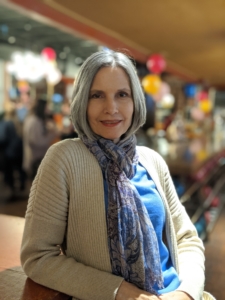Writing for the Love of Discovery: On Research and Ekphrasis
Editor’s Note: In this entry, Helen Fowler reflects on attending Charlotte Lit’s Poetry Workshopping feedback group with Danny Romine Powell last fall.

Helen Fowler
Knowing I have to write to meet a deadline can send me on a frantic search for a good prompt, that holy grail that leads to something worth writing about. Before I signed up for Dannye Romine Powell’s poetry workshop, which requires at least five poems to bring for review, I sized up the risk that I might come up short. I trusted that setting out on this journey would give me what I needed as I went along, and that my fellow writers would energize me in meeting this challenge. And that is just what happened.
One week I got a windfall. I found a picture that turned out to be a gold mine for inspiring a poem. It began with a notification of a post about a photo: “Helen Keller, Alexander Graham Bell, and a wind gauge.” In her post to the “Teaching with the Library of Congress” blog, Cheryl Lederle wrote an exploration of one of the photographs in a set of three that Dr. Bell had pasted into his journal on Sept. 2, 1901. The images document the scene of their kite flying event five days earlier at his residence in Nova Scotia, with his handwritten notation under photograph—“Helen Keller examining the operation of the wind gauge”—and his superimposed dotted lines to identify each figure, his own,“AGB,” mostly hidden as he stood behind Helen at the wind gauge.
I started out composing an ekphrastic poem to be present to the sensations of wind and the calculations the two friends were making as they launched their kites. But that’s not where it ended up. As I kept exploring primary sources, the imaginary landscape of the poem expanded with the opportunity to explore the relationship between the inventor and the deaf-blind woman who did not allow herself to be held back by her disabilities.
At first glance, they may have seemed to have little in common, but as I kept researching, I was struck by how deep their friendship ran. By the age of 29, Dr. Bell had already invented the telephone and was ready to invent more. The digital collections of the Library of Congress included Dr. Bell’s meticulously kept journals as well as correspondence Helen Keller had with Dr. Bell. I found Keller’s full autobiography in the public domain, along with a web page detailing Dr. Bell’s aspirations for designing an airship prior to the Wright Brothers’ successful flight in 1903.
I learned much I never knew: that Keller was a protege of Dr. Bell. That his father ran a school for the deaf in Washington DC. That Dr. Bell trained to take his father’s place. That both Bell’s mother and his wife were deaf. That when Helen was six years old, Dr. Bell introduced her to Anne Sullivan. That several days prior to the kite flying event, Keller gave an inspirational speech to a women’s club on the premises of Dr. Bell’s Nova Scotia residence. That they had gone on several kite flying expeditions and exchanged letters through 1907 as Dr. Bell pursued his designs for the airship.
As I delved into source materials that reflected their ongoing discussions about kites and his ideas for designing an airship, it became apparent that Bell valued Keller’s ideas. This produced two images that shape the last stanza: Keller’s envisioning of a “skyey port” long before airports became a household name, and Dr. Bell’s fascination with the motions of a bird’s tail in flight.
Letters spelled in
the hand, letters written
and sent. A deaf-blind seer envisions
a “skyey port.” Dr. Bell sketches
the motion of a bird’s tail in flight.
As two of history’s giants came to life for me in composing my own piece of writing, their histories fused with my own love of discovery. The act of writing is full of uncertainties. To find a prompt that can lever a search for understanding, something we hadn’t even realized we wanted to understand, means we had to be hungry enough to search in the first place. The takeaway for me in writing this piece was how they managed to nurture the sparks in each other’s journey. Their shared love of aviation made them inventive communicators with each other. I was amazed by how they found ways to envision possibilities together.
Helen Fowler is a retired school librarian and English instructor, immersed in the study of the literary arts for the value they bring to our lives, and in exploring digital and print library collections to curate good finds for idiosyncratic projects.
